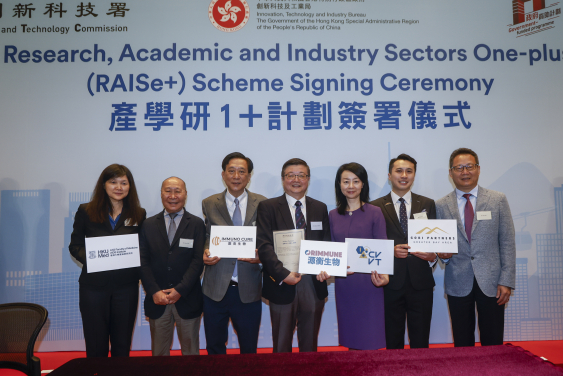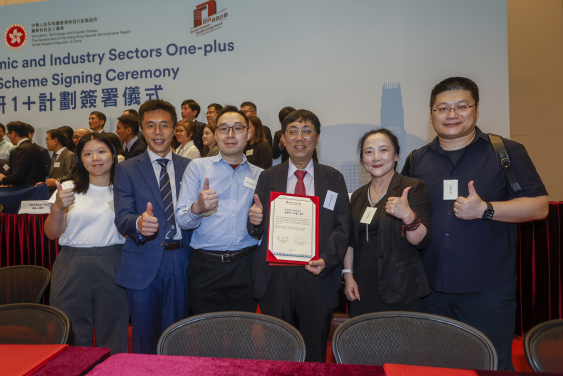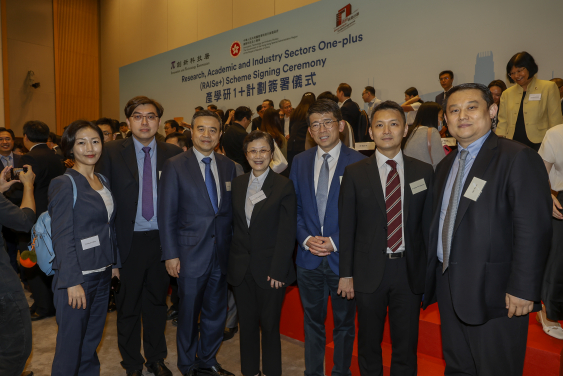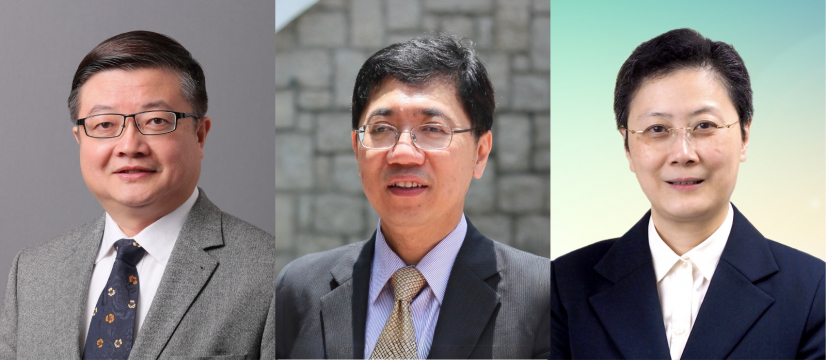Media
Three HKU research projects awarded funding under government's inaugural RAISe+ Scheme
28 May 2024
The University of Hong Kong (HKU) has received funding for three research projects under the Research, Academic, and Industry Sectors One-plus Scheme (RAISe+), as announced by the Innovation and Technology Commission (ITC) today (May 28). The awarded projects focus on developing immunotherapeutic drugs and innovative light-emitting materials.
Launched in October 2023, the RAISe+ scheme aims to unlock the potential of local universities in the transformation and commercialisation of research and development (R&D) outcomes while fostering collaboration among the government, industries, universities, and research sectors.
The three HKU projects are:
Research and development of the lead Δ42PD1 antibody drug as an immunotherapy against cancers and infections
This project is led by Professor Zhiwei CHEN, Director of the AIDS Institute and Chair Professor of the Department of Microbiology, School of Clinical Medicine, LKS Faculty of Medicine.
Although the market size immune checkpoint inhibitors (ICI) reached US$49.5 billion in 2023, the low ICI response rate of <20% among patients with liver cancer (hepatocellular carcinoma, HCC) calls for new anti-HCC immunotherapeutics with distinct targets.
In 2013, Professor Zhiwei CHEN’s HKU team discovered a novel drug target called Δ42PD1 and then Δ42PD1-blocking antibodies for immunotherapy. With the clinical development capabilities and financial support of Immuno Cure as the Industrial Partner, the HKU Team has established Orimmune BioTech Limited to jointly pursue the commercialisation of Δ42PD1-targeting drugs. This start-up aims to develop the lead Δ42PD1-blocking antibody drug into clinical trials against liver cancer as the first step, and against other Δ42PD1-associated cancers and infections as the second step.
Liver cancer, one of the most common cancer types worldwide, has a global market size of US$10.5 billion in 2021, and the market is expected to expand further. Statistically, more than 45% of the 900,000 new global liver cancer cases occurs in China. Orimmune aims to tap into the Mainland China market primarily and explore secondary markets and additional indications, as well through collaboration with overseas partners, to provide commercial viability.
Innovative molecular emitters for practical OLEDs and wearable devices
This project is led by Professor Chi Ming CHE, Zhou Guangzhao Professorship in Natural Sciences & Professor and Chair of Chemistry, Department of Chemistry, Faculty of Science.
OLED displays have been applied in smartphones, televisions, smartwatches, and VR headsets. However, the OLED industry faces three major challenges: (i) to achieve high efficiency blue and near-infrared (NIR) OLEDs, (ii) to reduce the cost of OLED emitters, (iii) to develop wearable biomedical devices incorporating flexible OLED displays.
The project primarily focuses on realising proprietary blue, green, red and NIR non-iridium OLED emitters based on phosphorescent platinum or metal-TADF (including gold, copper and palladium) complexes with high operationally stability and efficiency in OLED devices. This can reduce material costs and reliance on emitters based on the rare-earth metal iridium, thereby promoting the sustainable development of OLED technology. Establishing a patent portfolio of proprietary OLED emitters and devices with practical performance will enhance the competitiveness of the national OLED industry. Additionally, the research team is developing wearable display devices for phototherapeutic or biomedical applications, utilising its practically stable and efficient NIR-emitting or colour-tunable OLED devices.
In the RAISe+ programme, the project team has established strong partnerships with national and global companies. The team consists of a group of scientists and engineers with industrial backgrounds, dedicated to optimising OLED emitters and device architectures to improve device efficiency and operational lifespan, paving the way for commercialisation.
Transformative proprietary gold(III) luminescent materials for innovative applications
This project is led by Professor Vivian Yam, Philip Wong Wilson Wong Professor in Chemistry and Energy and Chair Professor of Chemistry, Department of Chemistry, Faculty of Science.
Based on the Nation’s No. 1 world ranking in gold mine production, the project team will fully exploit the country’s national resources on the much higher-abundance gold and the research team’s competitive edge in original discovery of gold(III) luminescent materials for OLED applications.
The project aims to unleash the full potentials of the research team’s proprietary gold(III) luminescent materials and expand their applications into healthcare industry. The project has gathered under it a world-class interdisciplinary research team with complementary expertise in chemistry, materials science, photophysics, computation, organic optoelectronics/electronics, device physics and engineering, medicine and clinical science to address the grand challenges. Through the synergistic team efforts, the present project will generate a novel series of high-performance gold(III) luminescent materials of international originality and possessing Hong Kong-owned intellectual property rights not only for OLED applications, but also to develop handy, compact and affordable non-invasive healthcare devices.
With the support of ITC and industrial partners, together with support from an aerospace industrial partner to conduct product trials at the Space Stations, the project team will contribute to finding innovative applications in healthcare industry and making contribution to the development of our National Space Science and Technology Mission.
Professor Max Shen, Vice-President and Pro-Vice-Chancellor (Research) of HKU was delighted with the funding results. He said: "We are honoured to receive this recognition and support from the government's RAISe+ scheme. The funding will accelerate the progress of these projects, enabling HKU researchers to develop innovative solutions, strengthen industry partnerships, and ultimately bring research outcomes to market.”
For media enquiries, please contact:
Communication and Public Affairs Office, HKU
Ms Melanie Wan (Tel: 2859 2600 / Email: melwkwan@hku.hk)
Ms Jaymee Ng (Tel: 3910 3612 / Email: ngjaymee@hku.hk)
Mr Kenneth Choi (Tel: 3917 2607 / Email: khkchoi@hku.hk)





